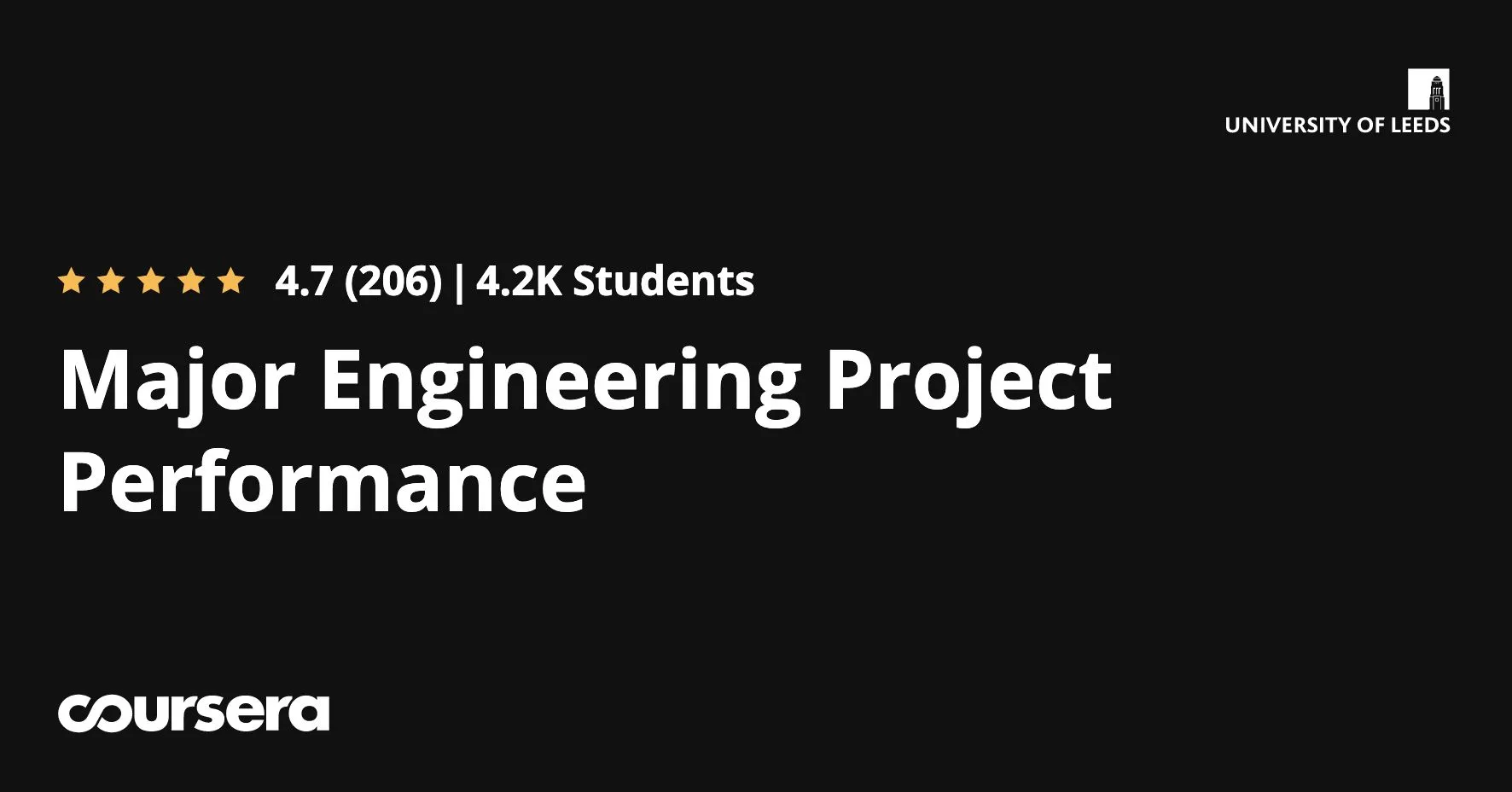
Major Engineering Project Performance 
This project management course provides an in-depth look at the key characteristics, factors, and risks associated with major engineering projects, as well as strategies to ensure successful delivery. ▼
ADVERTISEMENT
Course Feature
![]() Cost:
Cost:
Free
![]() Provider:
Provider:
Coursera
![]() Certificate:
Certificate:
No Information
![]() Language:
Language:
English
![]() Start Date:
Start Date:
Self Paced
Course Overview
❗The content presented here is sourced directly from Coursera platform. For comprehensive course details, including enrollment information, simply click on the 'Go to class' link on our website.
Updated in [March 06th, 2023]
Major Engineering Project Performance is an online course designed to help learners understand the fundamentals of engineering project performance. It covers topics such as project management, project planning, project scheduling, and project budgeting. Learners will gain an understanding of the various components of engineering project performance, and how to use them to ensure successful project completion. Additionally, learners will learn how to identify and address potential risks and challenges that may arise during the project.
Learners can learn how to effectively manage engineering projects from this course. They will gain an understanding of the different components of project performance, such as project management, project planning, project scheduling, and project budgeting. They will also learn how to identify and address potential risks and challenges that may arise during the project. Additionally, learners will learn how to use project management tools and techniques to ensure successful project completion.
Learners can also learn how to use project planning techniques to ensure that projects are completed on time and within budget. They will gain an understanding of the different project planning techniques, such as Gantt charts, critical path analysis, and resource allocation. Additionally, learners will learn how to use project scheduling tools and techniques to ensure that projects are completed on time and within budget.
Finally, learners can learn how to use project budgeting techniques to ensure that projects are completed within the allocated budget. They will gain an understanding of the different budgeting techniques, such as cost estimation, cost control, and cost optimization. Additionally, learners will learn how to use project budgeting tools and techniques to ensure that projects are completed within the allocated budget.
[Applications]
This course provides an overview of the major engineering project performance process. It covers topics such as project planning, budgeting, scheduling, and risk management.
After completing this course, students should be able to apply the concepts learned to their own engineering projects. They should be able to develop a project plan, create a budget, create a timeline, and identify and manage risks. Additionally, they should be able to use the tools and techniques discussed in the course to monitor and evaluate project performance. Finally, they should be able to use the knowledge gained to make informed decisions about their projects.
[Career Paths]
This career path focuses on the performance of major engineering projects. It involves the analysis of project performance, the identification of areas of improvement, and the implementation of strategies to improve project performance. This career path is ideal for those with a strong technical background and an interest in project management.
1. Project Manager: Project Managers are responsible for the overall management of a project, from planning and budgeting to execution and completion. They must be able to effectively manage resources, coordinate with stakeholders, and ensure that the project is completed on time and within budget. As the demand for engineering projects increases, the need for experienced project managers is also increasing.
2. Quality Assurance Engineer: Quality Assurance Engineers are responsible for ensuring that engineering projects meet the highest standards of quality. They must be able to identify potential problems and develop solutions to ensure that projects are completed to the highest standards. As engineering projects become more complex, the need for experienced Quality Assurance Engineers is also increasing.
3. Project Analyst: Project Analysts are responsible for analyzing the performance of engineering projects and identifying areas of improvement. They must be able to analyze data, identify trends, and develop strategies to improve project performance. As engineering projects become more complex, the need for experienced Project Analysts is also increasing.
4. Project Architect: Project Architects are responsible for designing and developing engineering projects. They must be able to create detailed plans and designs that meet the needs of the project. As engineering projects become more complex, the need for experienced Project Architects is also increasing.
[Education Paths]
This course provides learners with an understanding of the principles and practices of engineering project performance. It covers topics such as project management, project planning, project scheduling, project budgeting, and project risk management. Learners will gain an understanding of the various tools and techniques used to manage engineering projects, as well as the importance of communication and collaboration in successful project execution.
Recommended Degree Paths:
1. Bachelor of Science in Engineering Management: This degree program provides students with the knowledge and skills necessary to manage engineering projects. Students will learn about project management principles, project planning, project scheduling, project budgeting, and project risk management. They will also gain an understanding of the importance of communication and collaboration in successful project execution. This degree is ideal for those looking to pursue a career in engineering project management.
2. Master of Science in Project Management: This degree program provides students with an in-depth understanding of project management principles and practices. Students will learn about project planning, project scheduling, project budgeting, and project risk management. They will also gain an understanding of the importance of communication and collaboration in successful project execution. This degree is ideal for those looking to pursue a career in project management.
3. Master of Science in Engineering Management: This degree program provides students with an in-depth understanding of engineering project management principles and practices. Students will learn about project planning, project scheduling, project budgeting, and project risk management. They will also gain an understanding of the importance of communication and collaboration in successful project execution. This degree is ideal for those looking to pursue a career in engineering project management.
4. Doctor of Philosophy in Engineering Management: This degree program provides students with an advanced understanding of engineering project management principles and practices. Students will learn about project planning, project scheduling, project budgeting, and project risk management. They will also gain an understanding of the importance of communication and collaboration in successful project execution. This degree is ideal for those looking to pursue a career in engineering project management and research.
Developing Trends:
1. Agile Project Management: Agile project management is becoming increasingly popular in the engineering field. This approach focuses on rapid delivery of projects, with an emphasis on collaboration and flexibility.
2. Automation: Automation is becoming increasingly important in engineering project management. Automation can help streamline processes, reduce costs, and improve efficiency.
3. Data Analytics: Data analytics is becoming increasingly important in engineering project management. Data analytics can help identify trends, improve decision-making, and optimize project performance.
4. Artificial Intelligence: Artificial intelligence is becoming increasingly important in engineering project management. AI can help automate processes, improve decision-making, and optimize project performance.
Pros & Cons

Crisp and easy to understand

Real time project scenarios and assignments

Interesting examples and challenging tasks

New definitions and methods for major projects

Different aspects of project management

Requires account verification

More of case studies and theories

Assignments involve application of learning

Academic writing is demanding

Course covers many aspects
Course Provider

Provider Coursera's Stats at AZClass
Discussion and Reviews
0.0 (Based on 0 reviews)
Explore Similar Online Courses

The Leadership Training Program For Personal Success

Advanced Topics in Scaling Agile

Python for Informatics: Exploring Information

Social Network Analysis

Introduction to Systematic Review and Meta-Analysis

The Analytics Edge

DCO042 - Python For Informatics

Causal Diagrams: Draw Your Assumptions Before Your Conclusions

Whole genome sequencing of bacterial genomes - tools and applications

Cyber Security in Manufacturing

Creating Toolpaths for a CNC Lathe

Introduction to Solid Edge
 Related Categories
Related Categories
 Popular Providers
Popular Providers
Quiz
 Submitted Sucessfully
Submitted Sucessfully
1. What is the most important factor for a successful major engineering project?


Start your review of Major Engineering Project Performance